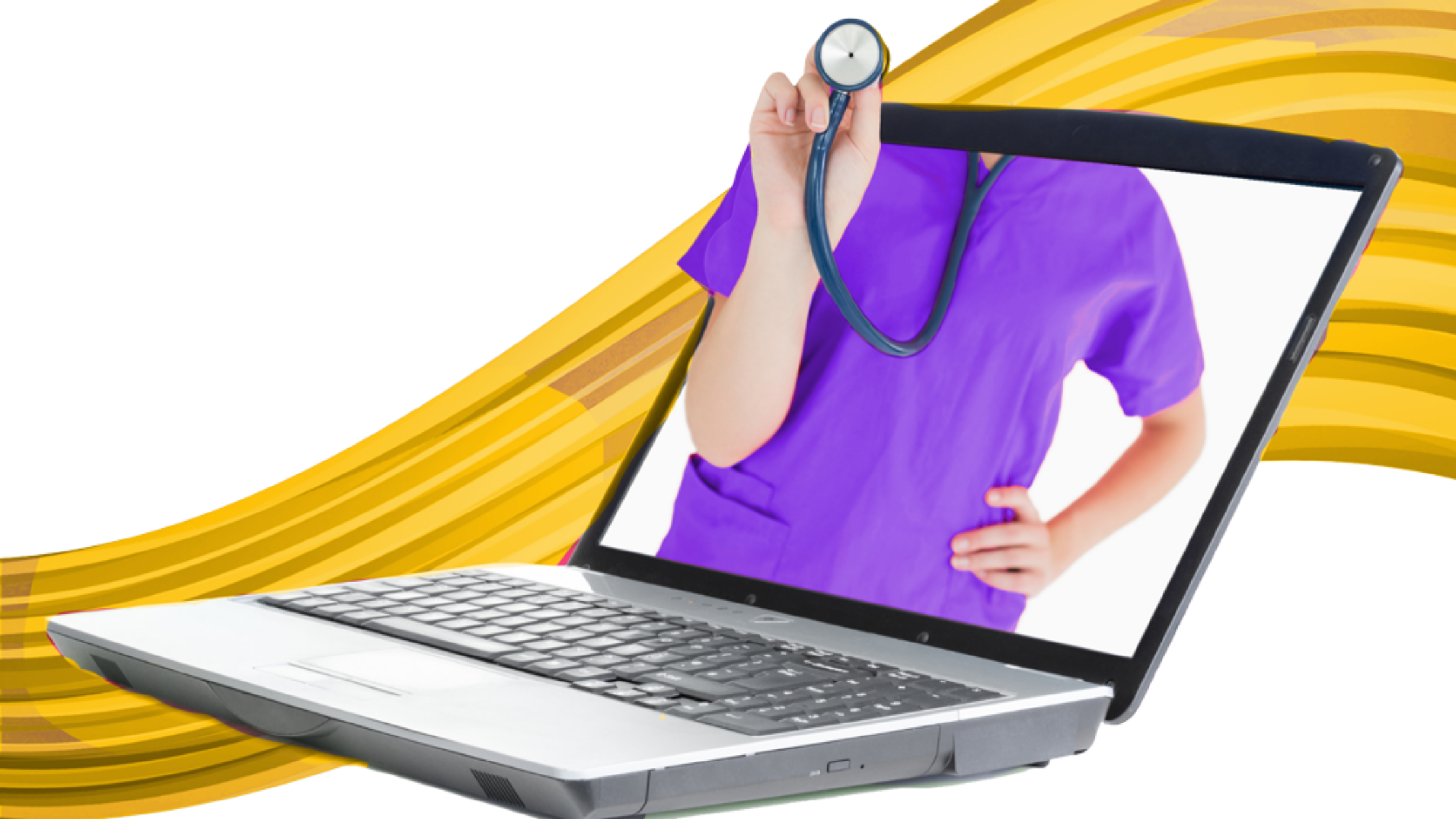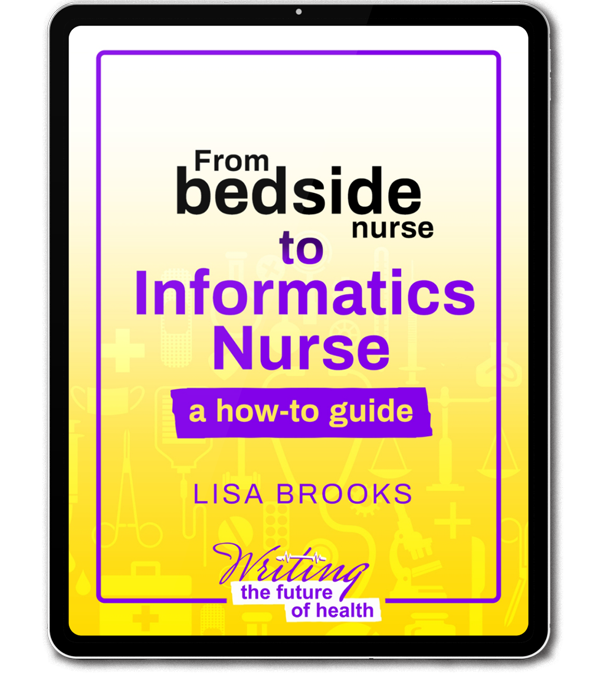Healthcare technology has been a growing field for some time. But the pandemic accelerated use of technologies for telehealth, remote patient monitoring, and digital therapeutics. Now even Amazon is a healthcare company. More nurses than ever are interested in being part of this wave, and I am frequently asked about how to get into Nursing Informatics.
I wrote an entire book on this topic specifically to help nurses get into this field without having to go to grad school. As I will discuss further in this post, the MSN in Nursing Informatics is not required. It is an option for nurses who know they want to get into leadership roles in Nursing Informatics, but it is also not the only option.
But first, it is important to understand what Informatics Nurses do and what are the actual requirements to become one.

What do Informatics Nurses do?
You can think of Nursing Informatics as a combination of Nursing, Computer Science, and Data Science. Nursing Informatics takes advantage of the technology and data available to solve clinical problems and improve health outcomes for people.

Informatics Nurses have a critical role in the ongoing development and improvement of health technology. We translate clinical and technical needs into something everyone on the team can understand. We are responsible for making sure technology is user-friendly and helpful for healthcare workers.
Because we sit between clinical and technical, Informatics Nurses drive how technology is applied in healthcare. This is especially important because health technology is one of the main reasons for clinician burnout. Even before the pandemic, studies found 40% of clinician stress came from the electronic health systems they used.
There are so many things Informatics Nurses can do, that it is hard to group our roles into one job description. The one common theme is we work with different stakeholders in healthcare and bridge gap between clinical and technical.

What qualifications are needed to become an Informatics Nurse?
It is a common misconception that the MSN in Nursing Informatics is required to enter this field. It is not, and neither is the Certification in Nursing Informatics. There are also plenty of Informatics Nurses who do not have a BSN. If you do a search for Nursing Informatics job postings, you will like see a number of them list the BSN, MSN, and certification as ‘preferred’ (i.e. optional) qualifications.
HIMSS – the largest organization for health technology professionals – does an annual survey of Nursing Informatics specialists who are members of professional organizations. Their 2020 survey found that:
- Only 27% of respondents had a Master’s in Nursing Informatics
- 47% have a Bachelor’s Degree in Nursing
- About 15% have an Associate’s Degree in Nursing
Respondents ranged from LPNs to DNPs, just to give you a sense of how flexible this field is with education backgrounds.
So, what is required to become an Informatics Nurse?
I recommend doing some research on job postings in your area with your current qualifications. Most job postings in my area (northeast U.S.) only require an RN license along with relevant experience. A BSN may be listed as ‘preferred’ – meaning optional – as is an MSN. But when I search nationally, I find a number that list either an RN or LPN license. However, all of the job postings specify candidates must have relevant experience.
Most of the time, recruiters and hiring managers are primarily looking for that relevant experience. In the business world, experience beats education nine times out of ten. If you put yourself in the hiring manager’s shoes, this makes sense.

The hiring manager likely has several major computer systems to keep running, and/or a big technology project underway. They do not want to waste their time hiring people who have all the degrees but little of the experience needed to jump in. They want candidates who can hit the ground running. This is no different from new nurses getting their first job – despite the nursing shortage it can take a while to get hired if you have not been a nurse before.
The hiring manager is also most likely a business person, not a nurse. They may or may not know what a master’s or certification in Nursing Informatics qualifies you to do. This was a rude awakening for me when I graduated from my MSN program. One of my first bosses was a technology guy who asked me on three separate occasions if I ever went to grad school.
If the MSN in Nursing Informatics is not required, is there any reason to get it?
There is still a place for the MSN in Nursing Informatics. If you plan to climb the career ladder into roles like Director or Vice President, a graduate degree is often expected. There are good reasons to climb that ladder, salary being a major one. Some big salaries in my area that typically require a master’s degree:
- Director of Clinical Informatics: $140,954 (source: Ziprecruiter)
- VP of Clinical Informatics: $240,000-$270,000 (source: Glassdoor)
However, I generally do not recommend nurses jump into the MSN as a way into Nursing Informatics without any prior exposure. That is a lot of money and time to dedicate if you are not sure you want to do this for the long term, or that you want to climb the career ladder.
The MSN also does not guarantee you will get a job by the time you graduate because experience still beats education. If you do not have experience, hiring managers will pass you over in favor of a nurse who does even if that nurse does not have a graduate degree. That is why I recommend nurses start by getting some experience in this field. Then if you reach a point in your career where the MSN in Nursing Informatics can help you get to the next level, go for it.


How do you get into Nursing Informatics?
Since I wrote a whole book on this topic, I will summarize the four-step process here. If you would like to learn more, I welcome you to read From Bedside Nurse to Informatics Nurse: A How-To Guide.
There are four main components of the journey from bedside nurse to Informatics Nurse. These components are:
Step 1: Learn the basics of health technology.
When you hear the term ‘health technology’ – what do you think of? The software used on a hospital unit for documenting a patient’s vital signs? Video visits with a provider instead of rushing to Urgent Care? Or maybe you think of your Fitbit or Apple Watch that tracks your heart rate and sleep?
All of those things fall under the heading of ‘health technology.’ The World Health Organization has a formal definition: “Health technology is the application of organized knowledge and skills in the form of devices, medicines, vaccines, procedures, and systems developed to solve a health problem and improve quality of lives.”

In simple terms, health technology is the use of technology to support health. Innovations in recent years expanded what can be called ‘health technology.’ This may be in the form of an electronic health record where providers document care; an automated blood pressure cuff that sends readings to a doctor’s office; or artificial intelligence that can spot a tumor in images of breast tissue.
The field of Nursing Informatics really stepped into the spotlight with the application of computer technology to healthcare. To become an Informatics Nurse, you need to understand what the key terms are, how health information systems work, and emerging topics such as artificial intelligence and digital therapeutics.
You can learn about health technology through self-study as well as on-the-job experience. Start by researching the technology used in your clinical setting. You can also reach out to the people in your organization who work closely with technology and ask if you can shadow for a day. This is also a way to start making contacts in the technology space.

Step 2: Master the key skills, methods, and tools of Nursing Informatics.
A lot of nurses think that they need to be technology whiz kids to become Informatics Nurses. In reality, the things you need to be a successful Informatics Nurse are not technical but organizational. There are software developers on the team to write code, testers to find bugs in that code, and technicians staffing the Help Desk who can assist with broken laptops.
In my entire career, I have yet to be asked to read or write a line of code. What I have had to do is talk with people – from frontline clinicians up to executives – and translate their goals and objectives into things technical people could understand.

What makes the role difficult is people do not always have their goals and objectives nicely articulated and neatly organized. In fact, much of an Informatics Nurse’s time is spent helping clinicians to shake out and organize their needs in a way that can be communicated to others.
Fortunately, there are a number of tools and methods to help with this process. I like to think of these tools and methods in the context of the main areas of focus for Informatics Nurses:
- Strategy Development
- Project Management
- Quality Improvement
- Data Management
- Learning and Change Management
Informatics Nurses are expected to have proficiency in these areas. All of these can be learned, whether on-the-job or in a classroom. You can start by researching each of these areas, and looking for online tutorials. Google offers some free tutorials in the areas of project management and data analytics, and they will even give you a certification if you complete the course. Just keep in mind that you need to apply these areas in real life. On-the-job experience is going to be more valuable than learning in a classroom and not applying them.

Step 3: Get hands-on experience with a real project.
The Nursing Informatics skills, tools, and methods will not fully click until you use them. The best way to learn is by getting real world experience.

In addition, to get into an Informatics Nursing job you need some experience on your resume. One of the biggest mistakes I see Nursing Informatics students make is to not take the hands-on learning experiences seriously. Too many of them just want to get through the program as fast as possible.
But then they have a rude awakening when they start applying for jobs. Just like no one wants to hire a bedside nurse with no clinical experience, no one wants to hire an Informatics Nurse with no Informatics experience. These nurses are shocked that their degree does not automatically open doors for them.
I recommend getting onto a real project at your current workplace. The purpose of doing a project (or even several projects) is to build your portfolio so you have examples to put on your resume. This is also a great way to start networking with people who can give you the inside track on open Nursing Informatics jobs.

Step 4: Make yourself an attractive job candidate.
The biggest mistake I see new Nursing Informatics graduates make is to approach health technology jobs like nursing jobs. In fact, many of them only revise their resume enough to show they have a new degree. They do not address any of the experience hiring companies expect to see.
Making yourself an attractive job candidate is an important final step to get into this new career. This includes revising your resume to highlight the relevant experiences you had (even in your clinical roles) and making sure you have an updated LinkedIn page (welcome to the business world where everyone is on LinkedIn!).

You will also need to prepare for interviews differently. Just like highlighting Informatics project experience on your resume, in interviews you will need to be able to provide relevant stories and examples.

Key Takeaways:
Hopefully this helps to give some insight into how to get into this field of Nursing Informatics. It is a wonderful field to be in with more opportunities than ever before. Nursing Informatics is one of the few nursing specialties where you can work from home (or anywhere) and command an excellent salary. The national average is $102,230 according to ZipRecruiter.
Nursing Informatics is a field you can get into without going to grad school. For anyone already in a master’s program for Nursing Informatics, some of this may have been hard to hear. Believe me – it was no picnic experiencing it.
But this information is relevant for anyone who wants to get into Nursing Informatics. Regardless of where you are starting from, it is an amazing career option for nurses.

Found this topic interesting? You may have the makings for a great Informatics Nurse! Check out From Bedside Nurse to Informatics Nurse: A How-To Guide in our online store, or by clicking here!







0 Comments